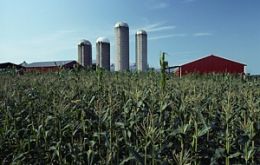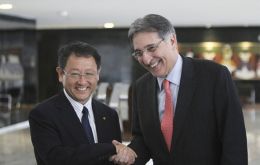MercoPress. South Atlantic News Agency
Brazil
-
Friday, August 10th 2012 - 08:35 UTC
Booming agriculture sees crop land prices in Brazil soar 18% in the past year

Prices of Brazilian crop land have soared 18% in the past year, to judge by data from one of the country's biggest agricultural groups, which revealed plans to take sowings nearly to 300,000 hectares, according to Agrimoney.com.
-
Friday, August 10th 2012 - 08:27 UTC
Toyota opens third plant in Brazil and announces engine plant

Toyota from Japan has inaugurated its third plant in Brazil that aims to produce 70,000 cars a year. The facility, located 90 kilometres west of Sao Paulo in Sorocaba, will begin producing Etios compact cars next month, with engines imported from Japan.
-
Friday, August 10th 2012 - 07:57 UTC
Brazil votes affirmative action for blacks and minorities in federal universities

The Brazilian Senate has approved an affirmative action bill that reserves half the spots in federal universities for high school graduates of public schools, and distributes them according to the racial makeup of each state.
-
Friday, August 10th 2012 - 07:49 UTC
Brazil reminds Paraguay that Itaipu power is jointly shared and managed

Brazil reminded Paraguay it can use the power it needs from the giant Itaipu hydro but there is a contract which regulates how to manage the surplus. A day earlier president Federico Franco said that Paraguay would not “yield” any more electricity to Brazil.
-
Wednesday, August 8th 2012 - 18:36 UTC
Brazilian Federal Police on strike; delays at airports and border crossings

The strike declared by the Brazilian Federal Police on Tuesday is beginning to cause difficulties at international airports, delaying the crossing of visitors to neighbouring countries and some organized pickets have been marching in front of federal government offices.
-
Wednesday, August 8th 2012 - 07:00 UTC
Patagonia province delegation promotes fishery produce sales in Brazil

A delegation from the Argentine Patagonian province of Chubut fishing industry is on a business round of Brazil and the first city to visit was Florianópolis. The group led by Chubut governor Martin Buzzi is also scheduled to visit Sao Paulo and Brasilia.
-
Wednesday, August 8th 2012 - 06:47 UTC
Poll shows deeper interest rates cuts expected from the Brazilian central bank

Weak economic growth will likely prompt Brazil's central bank to cut interest rates deeper than previously expected this year, a weekly central bank survey of economists showed on Monday.
-
Wednesday, August 8th 2012 - 06:37 UTC
Brazil begins major military exercise to test security along its southern borders

Brazilian Armed Forces began this week a major deployment along the borders of Uruguay, Argentina, Paraguay and Bolivia involving 9.000 troops from the three services with the purpose of testing border security against smugglers mainly of arms and drugs and organized crime, said the Ministry of Defence.
-
Tuesday, August 7th 2012 - 20:14 UTC
Mercosur has only benefited Brazil in the last ten years with a surplus of 36.8bn

Brazil is the only country that in the last ten years has benefited from Mercosur with an intra-zone trade surplus of 36.8 billion dollars while the other three full members, Argentina, Uruguay and Paraguay have accumulated huge deficits in the same period, according to Argentine economist Orlando Ferreres a regular columnist from La Nacion with graduate studies in Harvard.
-
Monday, August 6th 2012 - 08:14 UTC
Lugo going to appeal before the Inter American Court his removal from office

Fernando Lugo said he would appeal to the Inter American Court the whole political impeachment process in the Senate that ended with his removal from the Paraguayan presidency in less than 48 hours and with little chance of a defence.
